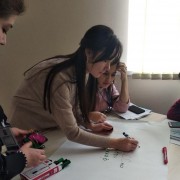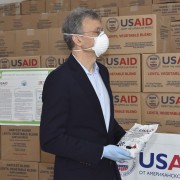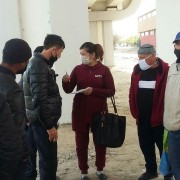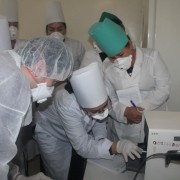Speeches Shim

To stop the spread of COVID-19, people across Central Asia are staying home and practicing social distancing to help flatten the curve. Yet quarantine and isolation can carry additional risks for families experiencing multiple stressors. Small shared spaces, limited mobility, uncertainty about the future, and loss of income are just a few of the factors that can build to domestic violence.

The United States, through the U.S. Agency for International Development (USAID), delivered 131,320 kg of food assistance worth almost $400,000 to Uzbekistan. This food assistance will reach more than 35,000 of the most vulnerable Uzbekistani citizens and be distributed through more than 144 health and social protection facilities. This includes facilities that are providing COVID-19 related quarantine services, long-term care to patients with multi-drug resistant tuberculosis (TB), to orphanages and mental health facilities.

Nilufar Artikova is a lawyer whose daily life consists of helping people in difficult circumstances. Her employer Istiqbolli Avlod (“Youth of the Future”) is a non-government organization (NGO) that provides free legal assistance to vulnerable populations such as migrant workers and victims of human trafficking and domestic violence. Istiqbolli Avlod was awarded a grant in February 2020 through the USAID Legal Reform Program to support their work.

The U.S. government, through the U.S. Agency for International Development (USAID), has announced an additional contribution to Uzbekistan’s efforts to combat COVID-19.

In commemoration of World Tuberculosis (TB) Day, the U.S. Agency for International Development (USAID) is proud of the shared gains with the Government of Uzbekistan achieved over the past two decades in the fight against this deadly but curable disease. USAID in partnership with the National TB Program has introduced the most modern anti-TB medications and new treatment models to Uzbekistan, trained health care workers to implement international TB control standards, and improved the capacity of laboratories by introducing rapid diagnosis tools such as GeneXpert machines.


Comment
Make a general inquiry or suggest an improvement.